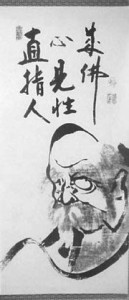 One day, the Fifth Patriarch summoned all the disciples to him for an announcement. He said: “Let me tell all of you, the most important thing for everyone in the world is life and death. If you seek enjoyment every day, rather than liberation from suffering, you will only lose yourself. If you are lost, how can enjoyment save you?
One day, the Fifth Patriarch summoned all the disciples to him for an announcement. He said: “Let me tell all of you, the most important thing for everyone in the world is life and death. If you seek enjoyment every day, rather than liberation from suffering, you will only lose yourself. If you are lost, how can enjoyment save you?
“I want all of you to go contemplate your wisdom, reflect on your original nature, and write a poem for me. If you can show a real understanding of the great truth, I shall pass my authority onto you and make you the Sixth Patriarch. Go do this quickly, without delay. No need to think about it too much. If you truly understand, you will see what I am looking for as soon as you hear my words.”
Excitement rippled across the temple as the disciples realized this was about succession at the temple. They discussed it among themselves, and one of them said: “What’s the use for us to rack our brains to write a poem? Shenxiu, the senior disciple, is our teacher. He will surely inherit the mantle, and we will all follow him. Why bother trying to write anything?”
All the disciples agreed with this, but Shenxiu listened to them from afar and felt conflicted. If they all did nothing and looked to him, then the pressure was on him to write something. If he also did nothing, how could the Master assess his level of understanding? If he wrote his poem for the dharma, that might be the right thing to do, but if he did it for the Master’s position, then how would he be any different from all the power-hungry people of the world? This was a difficult dilemma!
Shenxiu wrote his poem, but could not make himself submit it. He would walk toward the Fifth Patriarch’s room, only to find himself losing his nerve, sweating profusely, and unable to proceed further. He did this thirteen times over four days, feeling caught between a rock and the hard place. What could he do to end this internal battle against himself?
The Tao
The ultimate symbol of authority at the temple was a robe and a begging bowl. They originally belonged to Bodhidharma, the Indian monk who travelled to China and founded the order of Zen Buddhism as the First Patriarch.
There were no prescribed methods for the Patriarch of one generation to pass the robe and the bowl onto the next generation. The Fifth Patriarch could use whatever method he deemed appropriate, and he chose to do it on the basis of merit instead of rank. He looked beyond the surface and saw the essential equality of all sentient beings. Therefore, he regarded real understanding as being much more important than superficial measures like seniority.
His command to the disciples might seem unusual. No other tradition, before or since, utilized such a test or anything similar to it. It was not a test about knowledge, because spirituality could never be about memorizing facts or solving equations. It was a test about wisdom — the truths that transcended logic to resonate powerfully in the heart. In that context, the Fifth Patriarch’s requirement of poetic expression made perfect sense.
We can learn from the above. Sometimes, we may come across a lot of writing about spiritual topics, full of citations and historical footnotes. Such writing can be interesting in its own right, but it is not the essence. The ultimate truths of the world do not require massive volumes of text to explain. They can be expressed in a few simple lines by someone who really understands. By keeping this in mind, we can more readily distinguish the nuggets of wisdom from all the trivia out there.
We can also learn from Shenxiu. He was a man of honor who wished to do the right thing. As the senior disciple, he had the primary teaching duties under the Fifth Patriarch. As a true practitioner of everything he taught, he did not assume his role entitled him to be next in the line of succession. He embodied the virtue of humility, a virtue that we need for ourselves as we gain experience on the path.
The Fifth Patriarch was right. The most important thing in the world, in his time and ours, is the question of life and death. We are on a sacred quest for the answer. In time, we will find it. With a humble heart and an open mind, we will contemplate wisdom and reflect on the original nature of humanity. Ultimately, it is a path that will lead us to the liberation of the spirit — and the cessation of suffering.
- The Sad Lady - December 1, 2019
- Purchasing Yi - December 1, 2019
- The Seven Virtues of Water - August 21, 2018
